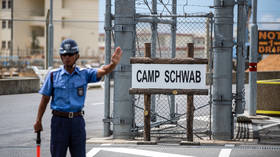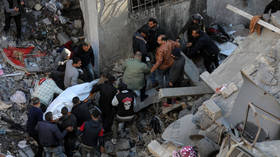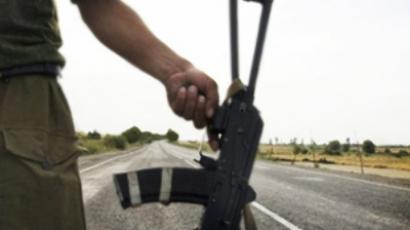Russia claims proof Georgia used cluster weapons
Russian investigators say they have evidence that the Georgian military used cluster munitions against civilians in South Ossetia in August 2008. The Georgians earlier said they only targeted Russian troops.
The news of the evidence comes from the spokesman for the Russian Investigative Committee of the Prosecutor’s Office, Vladimir Markin. The ITAR TASS news agency reports that Markin said numerous fragments of rockets with cluster heads have been found in the Ossetian village of Pris after shelling by the Georgian forces.
Markin also said Georgia used heavy aviation bombs, as two 500-killogram bombs had been defused by Russian combat engineers.
The official was summing up the committee’s probe into alleged war crimes by the Georgian military in South Ossetia. He said all the materials of the investigation will be sent to international criminal prosecution bodies.
“We plan to file to international criminal agencies evidence to seek the prosecution of some of the Georgian leaders guilty of genocide and mass slaughter of Russian citizens and peace keepers in South Ossetia,” Markin said.
Earlier, both Moscow and Tbilisi accused each other of using the controversial weapons during the conflict in August. The allegations were supported by independent investigators, including Human Rights Watch.
Russia denied the use of cluster bombs. Deputy Head of General Staff Anatoly Nogovitsin, who briefed the media in the times of hostilities, said ‘there was not need’ to do it. Georgia admitted it used cluster munitions, but said civilian objectives were never targeted.
The five-day war in South Ossetia started on August, 8, 2008, when Georgian troops launched an offensive against it's breakaway region. Russian peacekeepers stationed there were killed by an attack on their headquarters before Russia sent its troops and repelled the Georgians. South Ossetia was recognised as an independent nation by Russia following the EU-brokered peace settlement.
Cluster munitions are highly efficient against unprotected manpower. A cluster shell or bomb has up to several hundred individual elements, which are spread over a large area before exploding. However, some of them fail to trigger and can wound or kill people for years after if disturbed, posing great danger to the civilian population. The use of cluster weapons is also highly indiscriminate.
An international convention banning the use of cluster weapons was signed by over 90 countries in Oslo in 2008. Neither Russia nor Georgia was among them.
Ossetians still fear 8 months later
Claudia Pukhaeva is no stranger to the sounds of battle. The 68-year-old woman has had her home destroyed by bombing twice.
In 2008, she says, Georgian troops, which in August 2008 were stationed several hundred metres away from her place, shelled her village and totaled her house for the second time.
“We were totally blind with fear. They wanted to destroy us, the little helpless Ossetia. My brother had a daughter. She was 20-years-old and into her third month of pregnancy. The Georgians killed her,” Claudia recalls with sorrow.
There’s no single building intact in the village now, and it is hard to overestimate the loss.
On the edge of Claudia's village, there still is one of the notorious Grad rocket shells, which completely leveled one house and severely damaged the other.
Since August 2008, more than 3,000 Ossetians have applied to the European Human Rights Court alleging Georgia violated their human rights. But those behind the killings are still on the loose.
Meanwhile, for the people in South Ossetia, life goes on, but there is an underlying fear that the horrific events of last August could easily be repeated.
“Of course, it’s horrible. Of course, we’re afraid. Rumors have it today that the Georgians are preparing for another war,” says Claudia’s neighbor Zamira Gigolaeva.
Zamira admits they often hear sounds of gunfire and explosions at nights.













